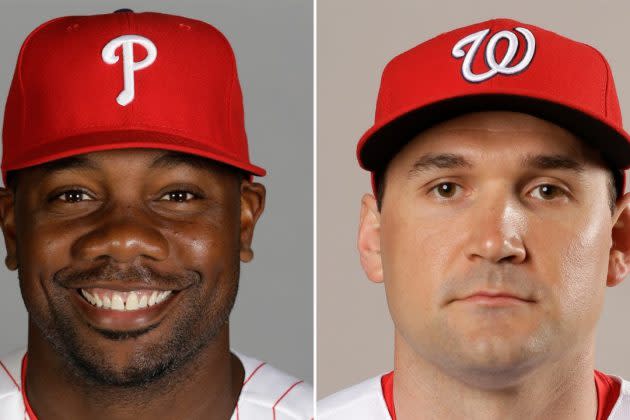Ryan Zimmerman and Ryan Howard Implicated in Al Jazeera Court Filing

A newly unsealed court document in the ongoing federal defamation lawsuit brought by Washington Nationals first baseman Ryan Zimmerman and retired Philadelphia Phillies first baseman Ryan Howard against Al Jazeera America and parent Al Jazeera Media Network raises questions about whether the two ballplayers used prohibited performance-enhancing substances.
In a memorandum dated Jan. 28, attorneys for the media company asserted they are in possession of “sealed evidence” that “includes an invoice showing that, in autumn 2014, Howard paid for needles and an [MLB-banned] substance called human chronic gonadotrophin.” The memorandum also referred to “email exchanges between Zimmerman and Charlie Sly, the PES dealer who unwittingly revealed that Zimmerman used performance-enhancing substances banned by MLB.”
The 36-year-old Zimmerman, who signed a one-year, $1 million contract to return to the Nationals after sitting out the 2020 season due to COVID-19 related family concerns, and the 41-year-old Howard, a former National League MVP who last suited up in 2016, sued Al Jazeera America in Jan. 2016 for libel and false light. They maintain the network’s Dec. 2015 documentary, “The Dark Side: Secrets of the Sports Dopers,” defamed them by claiming—falsely, Zimmerman and Howard charge—that they used the hormonal drug Delta-2, a muscle-building substance. Both players contend Al Jazeera America manufactured the allegation in order to boost ratings.
The documentary also accused a group of NFL players, including Peyton Manning, Clay Matthews and Julius Peppers, of using Delta-2 or Human Growth Hormone—which is only lawful with a physician’s prescription. Al Jazeera America stopped broadcasting in April 2016, though parent Al Jazeera Media Network retains a global reach.
The Jan. 28 memorandum serves as opposition to a request by Zimmerman and Howard to D.C. District Court Judge Ketanji Brown Jackson. They want her to exclude public access to a hearing transcript from October on grounds that it is “highly confidential.” Al Jazeera attorneys reject this attempted classification, arguing the documentary’s lead journalist, Deborah Davies, and her investigative team have been wrongfully denied the opportunity to share these players’ “close connection to a network of PES peddlers.” The Qatar-based media company claims that Zimmerman and Howard have “concealed from the public record over 4,000 additional documents involving 17 different people (many with no medical credentials or affiliation) and hundreds of pages of deposition testimony based on the frivolous claim that this evidence constitutes ‘medical conditions, medical treatments and medical advice’.”
To be clear, a claim in a court memorandum does not establish the matter as fact. Attorneys for Zimmerman and Howard insist their clients have done nothing wrong and have been unlawfully defamed. It will be up to the court to determine who if, if anyone, is telling the truth.
Still, the development highlights the risk for public figures in waging defamation lawsuits against media companies.
Zimmerman and Howard need to (1) prove that the documentary’s claims against them are false and damaged their reputations and (2) meet the “actual malice” standard for public figures in defamation lawsuits. To that end, they must establish that Al Jazeera America knowingly published false and damaging information or possessed reckless disregard for the information’s truth or falsity. In other words, Zimmerman and Howard need to show much more than the documentary was merely wrong and hurtful—they need to show it was recklessly reported.
Zimmerman and Howard must also attempt to mitigate the risk of public disclosures as their court battle lingers. Their litigation has been going on for five years and is currently at the summary judgment stage before Judge Jackson. Barring a settlement, the case could continue for years, particularly with the prospect of appeals. It remains to be seen what else might be alleged and which types of measures, if any, that MLB and sponsors—Zimmerman and Howard are likely bound by morals clauses in any endorsement deals—take.
The Hollywood Reporter’s Eriq Gardner contributed to this report.
More from Sportico.com
